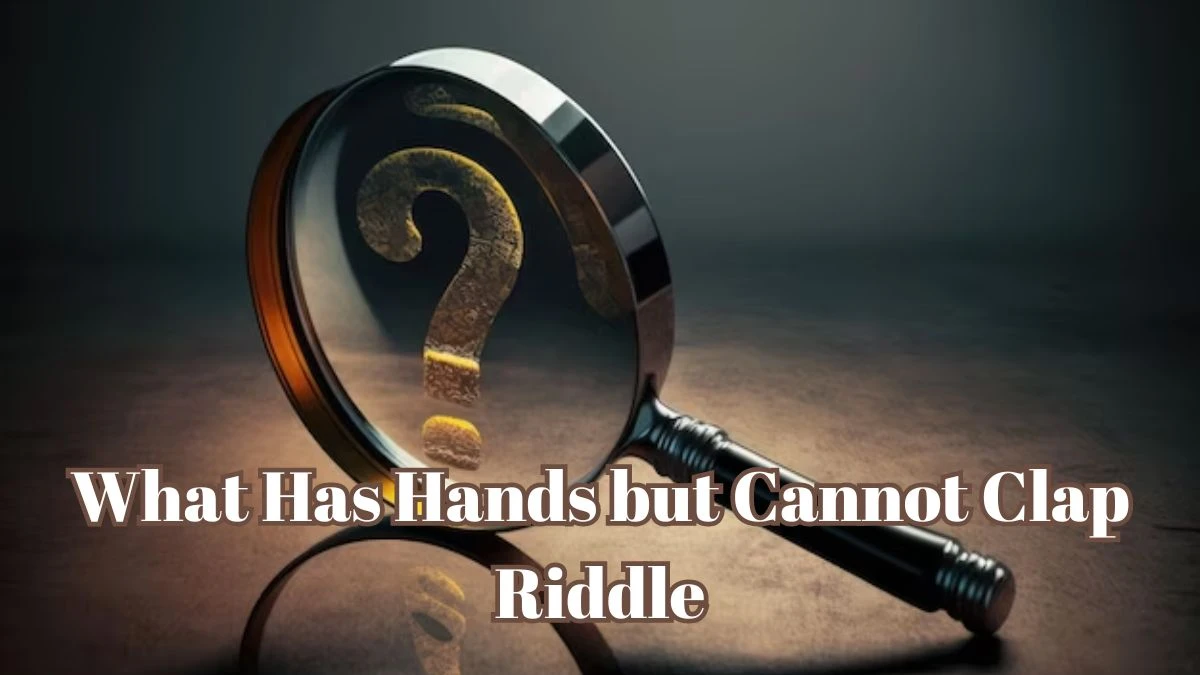- Rojgarlive »
- Riddle »
- What Has Hands but Cannot Clap Riddle and Answer
What Has Hands but Cannot Clap Riddle and Answer
by S Samayanka
Updated Feb 15, 2024

What Has Hands but Cannot Clap Riddle
The riddle "What has hands but cannot clap?" is a fun brain teaser that asks us to think beyond the obvious. It challenges us to consider objects or ideas that have certain characteristics but lack others. For instance, it hints at the hands of a clock, which resemble human hands but can't clap. This kind of riddle encourages us to think creatively and critically, pushing us to see things from a different perspective.
By prompting us to think figuratively rather than literally, it exercises our imagination and problem-solving skills. Riddles like this may seem simple at first glance, but they're designed to surprise us with unexpected answers, making us rethink our assumptions and stretch our mental muscles. Overall, they're a playful way to engage our minds and have some fun with language and logic.
Riddle: What Has Hands but Cannot Clap? Who Am I?
What Has Hands but Cannot Clap Riddle Answer
The answer to the riddle "What has hands but cannot clap?" is typically a clock. This answer may seem straightforward, but it relies on understanding the dual meaning of "hands." In the context of the riddle, "hands" refers to the physical pointers on a clock face that indicate the time. However, these "hands" are incapable of clapping because they lack the physical ability to do so.
The riddle is a clever play on words, challenging the reader to think beyond the literal interpretation and consider the symbolic meaning of the term "hands." By prompting this shift in perspective, the riddle encourages critical thinking and demonstrates how language can be used in imaginative and unexpected ways. Ultimately, the answer to the riddle serves as a reminder that words and concepts can have multiple layers of meaning, inviting us to explore these nuances in our interpretation.
Answer: A Clock
What is Riddle?
A riddle is a form of enigmatic expression that challenges the intellect and encourages creative thinking. It typically presents a puzzling question or problem, often in a metaphorical or allegorical manner, with the goal of teasing out a clever and unexpected answer.
Riddles have been an integral part of human cultures throughout history, serving as a source of entertainment, mental stimulation, and sometimes even educational tools. They exist in various forms, from verbal puzzles to written or visual conundrums. Riddles often require lateral thinking, as they demand individuals to approach problems from unconventional angles to arrive at a solution.
In essence, a riddle is a playful and imaginative exercise that invites individuals to engage their cognitive abilities, fostering a sense of curiosity and the joy of unraveling mysteries. Whether used for amusement, social interaction, or intellectual development, riddles endure as timeless expressions of human ingenuity and the universal desire for mental challenges.
Benefits of Solving Riddle
- Mental Exercise: Engaging with riddles provides a mental workout, enhancing cognitive abilities and boosting critical thinking and problem-solving skills.
- Language Development: Riddles, often filled with wordplay and clever language usage, contribute to the enrichment of vocabulary. Regular exposure improves linguistic creativity and proficiency.
- Cultivation of Creativity: The process of unraveling riddles encourages thinking outside conventional boundaries, fostering creativity and imaginative thinking.
- Entertainment and Social Interaction: Solving riddles is an enjoyable activity, offering entertainment and amusement. It can be a social experience, promoting interaction and friendly competition.
- Educational Insights: Riddles often convey cultural or historical insights, serving as a playful means to learn about language, traditions, and societal aspects. They can be incorporated into educational settings for engaging learning.
- Confidence Building: Successfully solving challenging riddles instills a sense of accomplishment, boosting self-confidence, and encouraging perseverance when faced with mental challenges.
- Memory Enhancement: Recalling information from riddles contributes to memory improvement. The mental effort involved in solving them strengthens memory retention.
- Logical Reasoning Development: Riddles typically follow a logical structure, guiding individuals through a sequence of thoughts or deductions. This aids in the development of logical reasoning skills.
What Has Hands but Cannot Clap Riddle - FAQs
A clock.
It requires understanding the figurative meaning of "hands" and thinking beyond the literal interpretation.
They stimulate critical thinking, creativity, and problem-solving skills.
They involve wordplay and clever language usage, enriching vocabulary and linguistic creativity.
They provide entertainment, promote social interaction, and can be used for educational purposes.




